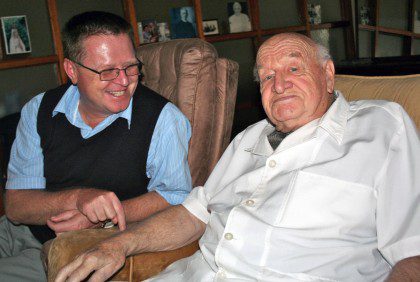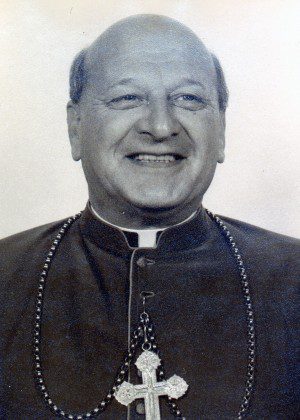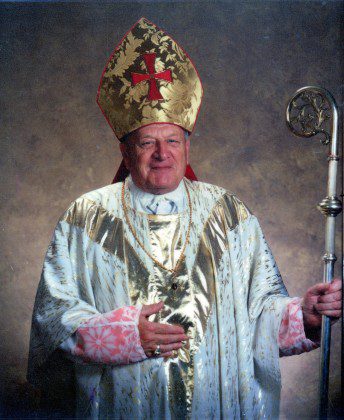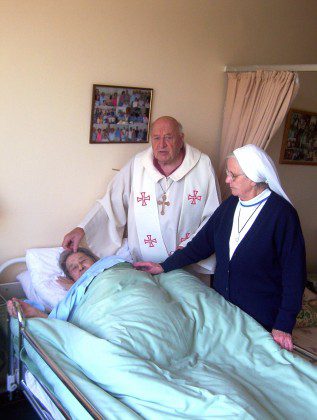
Congregation’s eldest bishop is a member of the US Province
The congregation’s eldest bishop, Bishop Evert Baaij, SCJ, hits an important milestone on March 24: he celebrates his 90th birthday.
A member of the Priests of the Sacred Heart since 1942 (next year he celebrates his 70th anniversary of profession!), Bishop Baaij was born in the Netherlands, became a citizen of Canada, is a member of the U.S. Province but has called South Africa his home for the past 54 years.
“I’m a citizen of the world,” he joked.
Bishop Baaij was introduced to the Catholic Church by a childhood friend. The friend told the young Evert that he was going to “tell his sins to the priest.” The bishop said that to an eight-year-old the idea of telling an adult “what you did wrong” sounded odd. “What punishment would he get for whatever he had confessed?”

Seeing his friend coming out of the confessional happy and smiling he decided to find out a bit more about the Catholic Church. He went to Mass with the friend and was so impressed by the sacredness of the celebration “that I decided that I wanted to become a priest,” said Bishop Baaij.
His parents gave him permission to take catechism classes while attending public school and his vocational call grew. He considered the diocesan seminary, but tuition was too high for a family just rebuilding after losing their business to the Depression. But then Providence stepped in via a knock on the family’s door. An SCJ was selling calendars as a fund-raiser. The young Evert told the SCJ about his desire to be a priest and the SCJ invited him to come to the SCJ seminary.
Not long after that calendar sale, Bishop Baaij was studying with the SCJ community in Helmond. Among his classmates were two other men who eventually went on to become bishops: Joseph Soudant, who became bishop of Palembang, Indonesia, and Paul Verschuren, who became bishop of Helsinki, Finland.
From the Netherlands to the rest of the world

Evert Baay was ordained a priest on July 20, 1947. After his ordination, he went to France for language studies in preparation for an assignment in French Canada. He arrived in Canada in 1949. There, he had his first experience with hospital chaplaincy, a ministry that has remained close to his heart.
Soon after his arrival in Canada, Bishop Baaij was transferred to the SCJ minor seminary in Delaware, Ontario. Besides teaching, he provided pastoral care to a sanatorium near London, Ontario, from 1952 to 1954. In 1955, Evert Baay became a Canadian citizen.
Two years later, he moved to the United States to teach at the SCJ seminary in Honesdale, Pennsylvania, where he taught Latin, Greek and physics. But when it was learned that he didn’t have the appropriate documents to work in the United States it was suggested that the bishop consider South Africa.
At the time, it was difficult for an American citizen to get a visa for South Africa. But since the bishop was a citizen of Canada, he didn’t need a visa. Just as he said yes to the call to go to North America, he again said yes to the missions in South Africa.
Bishop Baaij arrived in South Africa in March, 1957, and began ministry in Middelburg. He later served in Noupoort and in Colesberg. Because of apartheid laws, which were still in force in South Africa until 1994, the people he served were segregated into black, “colored” (the South African term for people of a mixed racial background) and white churches. Bishop Baaij attended to all, moving from church to church.
When the apartheid laws ended, he added South African citizenship to his Canadian citizenship.
In 1974, Pope Paul VI named him bishop of Aliwal North, South Africa. His bishop’s shield carries the Latin words: Veni Creator (Come, O Creator). Bishop Baaij said that he chose it because “God is the creator of the universe and we are God’s co-creators.”
Bishop Baaij served as bishop of Aliwal North until 1981 when health concerns prompted him to resign.
A new chapter

After his resignation, Bishop Baaij spent time in a rehabilitation facility to regain his health. He said that he knew that it was a time of transition, “but at first I didn’t know what I was transitioning to.”
He continued, saying that “life is a process of letting go, which will lead to new beginnings in hope.” He found his “new beginning” in the ministry that he first fell in love with years earlier in Canada –– hospital chaplaincy.
Since the mid-1980s Bishop Baaij has lived in the Diocese of Port Elizabeth where he has served as a chaplain to several hospitals and mental health institutions. Prior to his move to Port Elizabeth, he helped to establish two hospices in the KwaZulu-Natal Province in South Africa.
In recent years the bishop has had to reduce his workload. Occasionally he has had to take time away from his duties as chaplain to Nazareth House to attend to his own health concerns. But as he is able, he continues to minister to the elderly and sick.
“I should have retired years earlier,” he said, “these years in ‘retirement’ have been the best of my life!”
